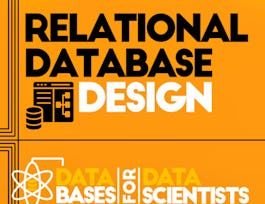This course provides you with the opportunity to learn about relational database design. You will be provided an in-depth understanding of the design principles and methodologies involved in creating well-structured, normalized, and efficient relational databases to manage data for small, medium, and large-scale enterprises.



Recommended experience
What you'll learn
Describe the process and the design aspects involved in relational database design.
Develop entity-relationship diagrams using basic and extended Entity-relationship features in relational design.
Identify and apply normalization techniques.
Details to know

Add to your LinkedIn profile
28 assignments
See how employees at top companies are mastering in-demand skills


Earn a career certificate
Add this credential to your LinkedIn profile, resume, or CV
Share it on social media and in your performance review

There are 4 modules in this course
Welcome to Relational Database Design! This course expounds upon the concepts covered in the course, Introduction to Relational Database, where you learned the fundamentals. In this course, you will focus on the design aspects of databases and explore practical examples to help you apply the concepts to real world scenarios. To help you concentrate on effective design, this course will be more theoretical and conceptual. You will not actually build the databases with software applications. You will do that in the course, Relational Database: Implementation and Applications. Sounds exciting, right? Let's begin with an overview of database design covering three main lessons: 1) Entity-Relationship (E-R) modeling, 2) E-R diagrams, and 3) Extended ER features and relation schemas. Please review the module learning objectives below and refer them as a guide for your learning.
What's included
4 videos19 readings11 assignments1 discussion prompt
This module explores the theory and practical application of functional dependencies in relational database design, providing students with the knowledge and skills to identify and enforce data relationships, ensuring data integrity and optimization in database systems. This module is organized into three lessons: 1) Functional dependency theory, 2) Finding candidate keys and attribute closure, and 3) Deriving canonical (minimal) covers of functional dependencies. The learning objectives of this module are presented below. Please refer to the enrichment activities at the end of each lesson.
What's included
3 videos7 readings9 assignments
The database normalization module demonstrates the principles and techniques of organizing data into well-structured tables through normalization, ensuring data integrity and reducing redundancy for efficient and scalable database systems. This module is organized in three lessons: 1) Normal Forms (NFs), 2) more Normal forms, and 3) DB Design example (applying ER modeling + Normalization). The learning objectives of this module include are presented below. Refer to the enrichment activities at the end of each lesson.
What's included
3 videos10 readings7 assignments1 peer review
This module contains the summative course assessment that has been designed to evaluate your understanding of the course material and assess your ability to apply the knowledge you have acquired throughout the course. Be sure to review the course material thoroughly before taking the assessment. A learning guide is also provided to help you prepare for the assessment. Please review prior to launching the assessment. You will only have one attempt to take it, so please plan accordingly. Best wishes to you for success!
What's included
1 assignment
Offered by
Why people choose Coursera for their career




Recommended if you're interested in Computer Science

University of Colorado Boulder

Illinois Tech

Illinois Tech

Coursera Project Network

Open new doors with Coursera Plus
Unlimited access to 10,000+ world-class courses, hands-on projects, and job-ready certificate programs - all included in your subscription
Advance your career with an online degree
Earn a degree from world-class universities - 100% online
Join over 3,400 global companies that choose Coursera for Business
Upskill your employees to excel in the digital economy




